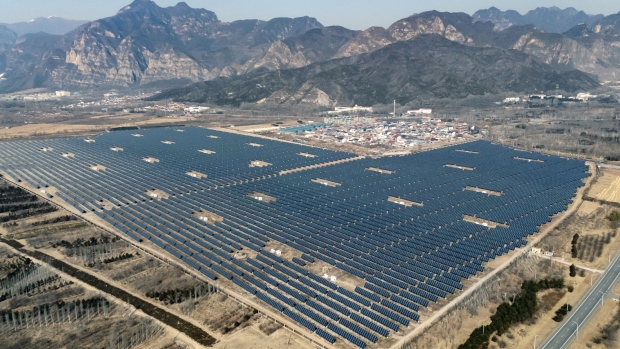May 1, 2024
US, Europe Fear of China's Dominance Threatens Climate Fight, Says Xi's Envoy
, Bloomberg News

(Bloomberg) -- Efforts by the US and Europe to stem China's dominance in green technologies risk stalling the fight against global warming, according to the veteran diplomat tasked by Xi Jinping to represent the top polluter on climate issues.
Liu Zhenmin, appointed in January as Xi’s Special Envoy for Climate Change, this month heads for his first in-person meetings in the US since taking the role. Those talks come at a crucial juncture for international cooperation — with skepticism about pledges to phase out fossil fuels, continued wrangling over funding for developing nations, and rising trade protectionism targeted at clean energy supply chains.
Treasury Secretary Janet Yellen has issued warnings about China’s overcapacity and record exports of cheap solar equipment and lithium-ion batteries, while the European Union has launched probes into clean energy and electric vehicles.
“We need to maintain low costs, otherwise nobody is going to be able to afford the energy transition,” Liu said in an interview with Bloomberg Television. “What I’m worried about is if the US and European Union continue to insist on that approach, it would result in a delay in the substitution of fossil fuels by renewables globally.”
Relying on technology made outside China could lift global energy transition costs by as much as $6 trillion, or 20%, Liu said, citing a Wood Mackenzie analysis. Other countries can instead take advantage of the boom among Chinese companies in production of clean energy equipment, batteries and electric vehicles, which has dramatically lowered costs.
“After more than a decade of their hard work, now we have cheaper wind and solar products, which make it more affordable to start the energy transition,” he said. “I think that this is good for both China and the world.”
Liu, who will meet in Washington with counterpart John Podesta, is optimistic over China’s ability to meet Xi’s targets to peak carbon emissions by 2030 and hit net zero by 2060. He also sees the US and China as able to cooperate to continue to lead global action.
There’s potential to help other nations develop their own clean energy supply chains, including by Chinese companies investing in joint ventures, according to Liu. Already China-based producers are building solar plants in the US, battery factories in Hungary and electric vehicle assembly lines in Thailand.
“Between China and the US, I hope we have more cooperative enterprises,” he said. “I think this joint design, this joint manufacturing, I think it will be good to remove all these worries.”
Read more: US, China Start New Climate Era After Veteran Envoys Step Down
A fluent English speaker and law-school graduate, Liu, 68, served as vice minister for foreign affairs until 2017, when he took up a United Nations post.
While known as a skilled diplomat who’s well-versed in climate issues — and previously involved in Kyoto Protocol and Paris Agreement negotiations — it’s less clear if he can match his predecessor’s influence on China’s policies, according to Cory Combs, a climate analyst at Trivium China.
China’s previous envoy Xie Zhenhua, who Liu calls a “climate hero,” is widely credited with helping convince Xi to set a 2060 goal for carbon neutrality. Xie had served as the No. 2 official at China’s top economic planning body, and ran a highly respected climate science institute at Tsinghua University.
Read More: The Secret Origins of China’s 40-Year Plan to End Carbon Emissions
“Liu is really smart, but no one really has a clear sense yet of his capability to sway agents of decision making,” Combs said.
To deliver an impact, Liu’s focus will need to be on domestic action in addition to global ties. China remains by far the largest emitter of heat-trapping greenhouse gases, is the biggest importer of oil and natural gas, and also mines and burns more than half the world’s coal.
After seeming to peak a decade ago, China’s coal use has been on the rise following a series of domestic power shortages that stoked energy security worries, and as a result of higher gas prices following Russia’s invasion of Ukraine in 2022. The nation’s production of the fuel soared to a record last year, and China is in the midst of building a huge fleet of new coal-fired power plants. Further complicating matters is a slowdown in economic growth.
“Expectations continue to increase, but what China can offer right now is limited because of different concerns, mostly economic but also on energy security as well,” said Yao Zhe, global policy advisor for Greenpeace East Asia in Beijing. “So Liu has the difficult job of not just having these conversations internationally, but also to mobilize support and resources domestically.”
Clean energy sources could eventually account for more than 80% of China’s power mix, Liu said in the interview. Coal currently makes up about 56% of electricity generation and will continue to decline, he said.
“Coal will be difficult to phase out entirely, but we need to ensure that coal can be used more cleanly,” according to Liu.
China’s world-beating deployment of renewables — the nation added more solar panels in 2023 alone than the entire US fleet — is finally encountering headwinds this year, as manufacturers see profits slashed and power grids struggle to handle the massive influx of intermittent power.
Though some regions are now requiring solar and wind farms to curtail generation at certain times to ensure power infrastructure isn’t overloaded, the issue is another climate challenge that China can quickly address, according to Liu.
“We will have to transform and upgrade the national grid,” he said. “It will not take a decade, it will take a few years.”
©2024 Bloomberg L.P.






